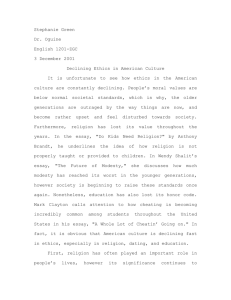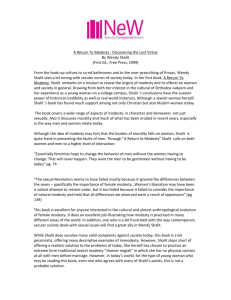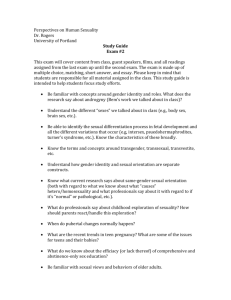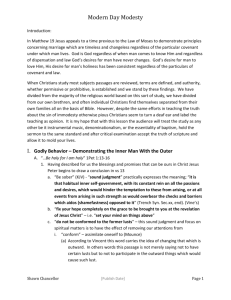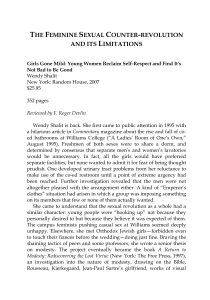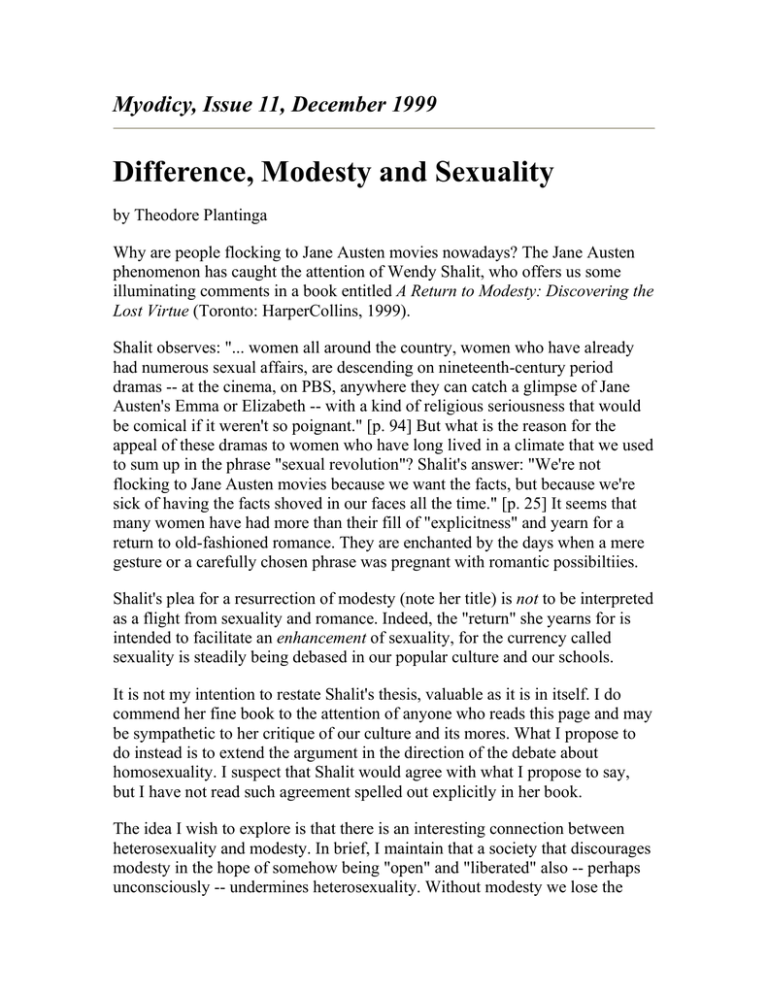
Myodicy, Issue 11, December 1999
Difference, Modesty and Sexuality
by Theodore Plantinga
Why are people flocking to Jane Austen movies nowadays? The Jane Austen
phenomenon has caught the attention of Wendy Shalit, who offers us some
illuminating comments in a book entitled A Return to Modesty: Discovering the
Lost Virtue (Toronto: HarperCollins, 1999).
Shalit observes: "... women all around the country, women who have already
had numerous sexual affairs, are descending on nineteenth-century period
dramas -- at the cinema, on PBS, anywhere they can catch a glimpse of Jane
Austen's Emma or Elizabeth -- with a kind of religious seriousness that would
be comical if it weren't so poignant." [p. 94] But what is the reason for the
appeal of these dramas to women who have long lived in a climate that we used
to sum up in the phrase "sexual revolution"? Shalit's answer: "We're not
flocking to Jane Austen movies because we want the facts, but because we're
sick of having the facts shoved in our faces all the time." [p. 25] It seems that
many women have had more than their fill of "explicitness" and yearn for a
return to old-fashioned romance. They are enchanted by the days when a mere
gesture or a carefully chosen phrase was pregnant with romantic possibiltiies.
Shalit's plea for a resurrection of modesty (note her title) is not to be interpreted
as a flight from sexuality and romance. Indeed, the "return" she yearns for is
intended to facilitate an enhancement of sexuality, for the currency called
sexuality is steadily being debased in our popular culture and our schools.
It is not my intention to restate Shalit's thesis, valuable as it is in itself. I do
commend her fine book to the attention of anyone who reads this page and may
be sympathetic to her critique of our culture and its mores. What I propose to
do instead is to extend the argument in the direction of the debate about
homosexuality. I suspect that Shalit would agree with what I propose to say,
but I have not read such agreement spelled out explicitly in her book.
The idea I wish to explore is that there is an interesting connection between
heterosexuality and modesty. In brief, I maintain that a society that discourages
modesty in the hope of somehow being "open" and "liberated" also -- perhaps
unconsciously -- undermines heterosexuality. Without modesty we lose the
erotic. Argues Shalit: "Without modesty, we are lost -- not excited by anything
much, and not knowing what the problem is. ... But maybe we're not having fun
because everything is permitted. Maybe without modesty, we forgot what is
erotic." [pp. 180-1]
Some might wonder whether a decline of heterosexuality is really something to
be lamented. My answer would be an emphatic yes. But the defense of
heterosexuality as a good thing, as what one would wish for people in general,
and not just for one's own self, lies outside the bounds of this small essay. Here
I only propose to explore the question why proponents of heterosexuality
should welcome Shalit's defense of modesty.
Writing about sexuality is difficult because it is so personal: one feels inclined
to mention one's own experiences, but such an enterprise would fly in the face
of Shalit's call for modesty. Thus I do not plan to lay bare my own sexual
history, except to affirm that it is exclusively heterosexual. But I must also take
account of the fact that because I am male and have never engaged in
"transvestite" or "transgender" activities of any sort, I have not experienced a
broad range of human heterosexual experience, as some other males have done.
Thus there is the possibility that what I write might seem one-sided or even offkilter to some readers, perhaps especially heterosexual females, whose inner
experience of sexuality I can know only at second hand.
The attraction of a normal heterosexual male may be focused on one female
who is his partner and lover and wife, but he will probably feel attracted to
other females as well from time to time. Attraction itself, while an unfulfilled
form of sexuality, has its own value and appeal. And that appeal, in my own
experience, is grounded in difference. One of the mysteries of sexuality for me
is why in the world females would find the male body (mine, or that of any
man, for that matter) appealing in the first place. It is female flesh that awakens
my sexual interest. And thus there is in me -- and in most men, I suppose -- a
residual, and continuing, and easily awakened interest in the female body, an
interest that can be spoiled by excessive exposure.
This problem of excessive exposure has a great deal to do with the value of
modesty. It is almost as though the immodest are debasing the currency that we
call sexual appeal.
A small qualification is needed here. We must make some sort of distinction
between immediate, short-term sexual desire and fulfillment, on the one hand,
and a deeper desire for a relationship that includes sex but is fueled and
supported by love understood in old-fashioned terms as a yearning for a
lifelong union of mind and heart and flesh. It is the latter yearning, which
seems to me to be the truly worthy aspiration of the lover, that is especially
debased by immodesty.
Now, I am willing to admit that what constitutes modesty in the eyes of one
person might not count as such in the eyes of another. What does Shalit take it
to be? Some examples of deplorable immodesty drawn from her own
experience as an undergraduate student at Williams College (she graduated in
1997) can help us understand why she speaks of an "attack on modesty" (p. 43)
and identifies modesty as the new taboo.
The following, according to Shalit, is the situation in many colleges and
universities today: "At one point, not so terribly long ago, universities used to
be on the side of those who wanted to study, and defended them against the
pressures of sex. If students did have sex, it had to be furtive. You had to sneak
into someone's room or car. Now when your roommate is having sex, you are
the one expected to sneak around ... you are the one who should be ashamed of
yourself for not being sufficiently libertine. You are the one who must `quietly
confess' your taste for sexual modesty, as if admitting some depravity." [p. 62]
Shalit offers us two examples drawn specifically from her days at Williams.
The first is the enforced intermingling of the two genders in such everyday
matters as bathroom use.
Coed education, nowadays, means much more than males and females
attending the same lectures. In her freshman year Shalit discovered that she
would be a sharing a bathroom with male students. She told her female
dormmates that she didn't like the idea: "Immediately one girl smiled
condescendingly and wrapped her arm around my shoulder, explaining that she,
too, once thought she wouldn't like coed bathrooms, but then `I became
comfortable with my body.'" Shalit's response was that she was indeed
comfortable with her own body: what caused her discomfort was the prospect
of strange men seeing her coming out of the shower (see pp. 86, 233-4).
It is not only females who feel uncomfortable at such enforced intermingling of
young men and women. Shalit also discusses the well-known story of a group
of five Orthodox Jewish male students who enrolled at Yale University and had
such immodesty forced upon them in their living arrangements (see pp. 61-2).
They protested on religious grounds, but the university would not listen, as
though immodesty were now part of the curriculum.
The Jewish connection is significant. In case you wonder where Shalit learned
about modesty in the first place, the answer is simple: from the Jewish
tradition. One of the most charming aspects of her book is her account of how
she "escaped" sex education (see pp. 16-17, 25), in the belief (amply justified,
in my view) that it has the effect of increasing coarse and inappropriate sexual
behavior. And its effect is not confined to behavior; such education also shapes
attitudes. Shalit laments: "Anyone who's been through the mill of my
generation's sex education has trouble understanding why I'm concerned about
the things I'm concerned with ..." [p. 25] What the graduates of sex education
classes seem to have been told is that sex is "healthy." But what they have also
picked up is that sex is "no big deal" (see p. 28).
Both the modesty and the romance that made it enchanting for so many people
throughout human history have been banished by the new attitudes. The
campaign for a "brave new world" of immodesty has taken the magic and allure
out of the sexual attraction between men and women. Shalit calls it the
"disenchanting of sex" and connects it with what she calls "sexual brutality" (p.
19). As a result of this coarsening, we now have endless problems with "sexual
harassment" and "date rape" and the like. It appears that there are not a lot of
gentlemen to be found in the ranks of the young males on campus.
The second Williams College story that taught Shalit that immodesty has
become part of the informal curriculum of the modern college and university
has to do with the college's coed or mixed wrestling team (see pp. 175ff, 233ff).
When she first heard that there was such a team, she couldn't believe it. She
expressed her dismay but was reassured by a student who told her that there
was "nothing sexual" about a man wrestling with a woman!
Earlier I promised to extend Shalit's analyses into the domain of
homosexuality. The connection is not hard to make. Take this business of
equality, which nowadays is thrust upon us in all sorts of ways. We are told that
men and women are "equal," but what is this supposed to mean in concrete
terms?
In good measure, it means that there is no significant difference between the
two genders. Gender, in the fashionable parlance of many of today professors
and pundits, is merely a "social construct," which we are free to discard once
we realize how hollow it is. But what if you are of the old school, so to speak,
and actually believe that there are profound differences between the two
genders, differences that are not inculcated in our upbringing? Then you are to
be pitied, and perhaps reviled as well.
This Shalit found out when she had the nerve to defend what the egalitarians
have taken to calling "gender dualism" (see p. 156). When she spoke out on this
subject in class one day, she was told that she was an "essentialist." Then
followed an interesting exchange with enlightened classmates: "What is an
essentialist? I asked my classmates. `It's someone who believes there are
differences between the sexes,' they explained. But aren't there? `No,' they
chorused, quite firmly. The earnest boy behind me tried to help me out,
clarifying that `the whole point is that we're supposed to try to transcend
essentialism.' But even if I wanted to transcend essentialism, I asked them,
shouldn't we first find out what the differences are, so we know what we're
supposed to be transcending? No, even to mention `real differences' is itself
essentialist, no matter what your intention is." [p. 87] The printed word was
brought to bear on this argument, and Shalit was informed that essentialism is
the "heresy" that "there are biological differences between males and females"
(p. 87).
Think about it: the flesh of a person of the other gender is fundamentally no
different from my own. That's what we are supposed to believe. Well, if that's
the case, there is no reason for me to feel more self-conscious in the presence of
a female than I would in the presence of another male if I were in a state of
undress. Neither, presumably, is there any reason for me to find the flesh of
women more enchanting than I find my own or the flesh of other men. And so I
must conclude that the anti-essentialist sexual ideology Shalit was battling at
Williams College cannot help but promote a homosexual sensibility. It should
lead me to ask what is wrong with me for not finding the sight of an admittedly
handsome man sexually appealing.
Strictly speaking, what we have here is a defense of bisexuality more than of
homosexuality. The logic of the antiessentialist position is that one should find
one's fellow human beings in general to be possible objects of sexual desire
(presumably thoughts of gender identification should not even come into the
picture). I am reminded of what Martine Rothblatt wrote The Apartheid of Sex:
A Manifesto on the Freedom of Gender. (New York: Crown Publishers, 1995).
Rothblatt would like us to stop thinking in terms of people being either male or
female.
What is to be said in response to the challenge which Shalit lays before us? On
the philosophical level, at least this, that proper sexual desire is deeply bound
up with difference. If it is indeed ordained of God himself -- as I believe -- that
a man's desire shall be for the woman, and vice versa, it is because the opposite
gender is different from oneself in a fascinating way that moves us at a level
too deep to articulate fully.
How shall we then live, sexually speaking? For one thing, we should preserve
the magic of that difference by promoting modesty in all sorts of ways, lest for
us, as for so many jaded college students today, sex should become "no big
deal." Let us then affirm "essentialism" openly and unashamedly and
rediscover what modesty can mean as we enter a new century. Let us hope that
men will welcome women in the world of work but still want them to retain
their alluring otherness and the modesty that draws us to them ever more.
If I wore a hat, I would tip it in Wendy Shalit's direction for re-opening the
subject of modesty in such a marvelous way. Perhaps there are some who still
don't understand, who think that modesty could be just another choice some
people may make in a pluralistic culture. I will leave it to Shalit to speak the
last word to such libertines: "One of my professors ... asked me why I couldn't
`just be modest and shut up about it!' The answer is that modesty simply cannot
be `just' a private virtue --a `personal choice' -- in a culture where there is such
a high survival value placed on immodesty. The choices some women make
restrict the choices open to other women. Perhaps this is where liberalism
failed, because it claimed society could be simply neutral about individuals'
choices, and it never can." [p. 228]

